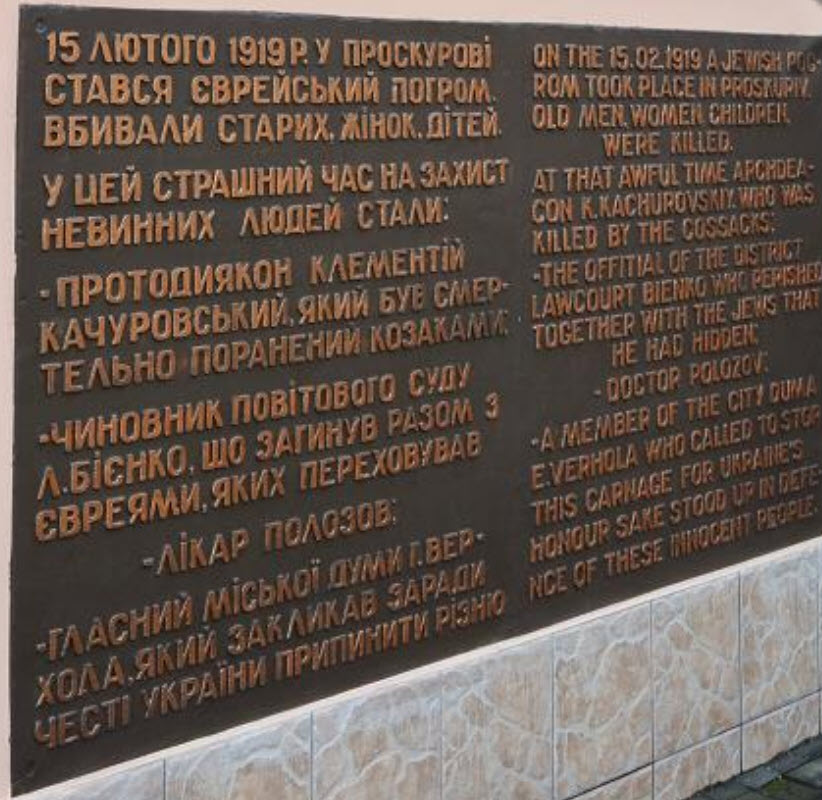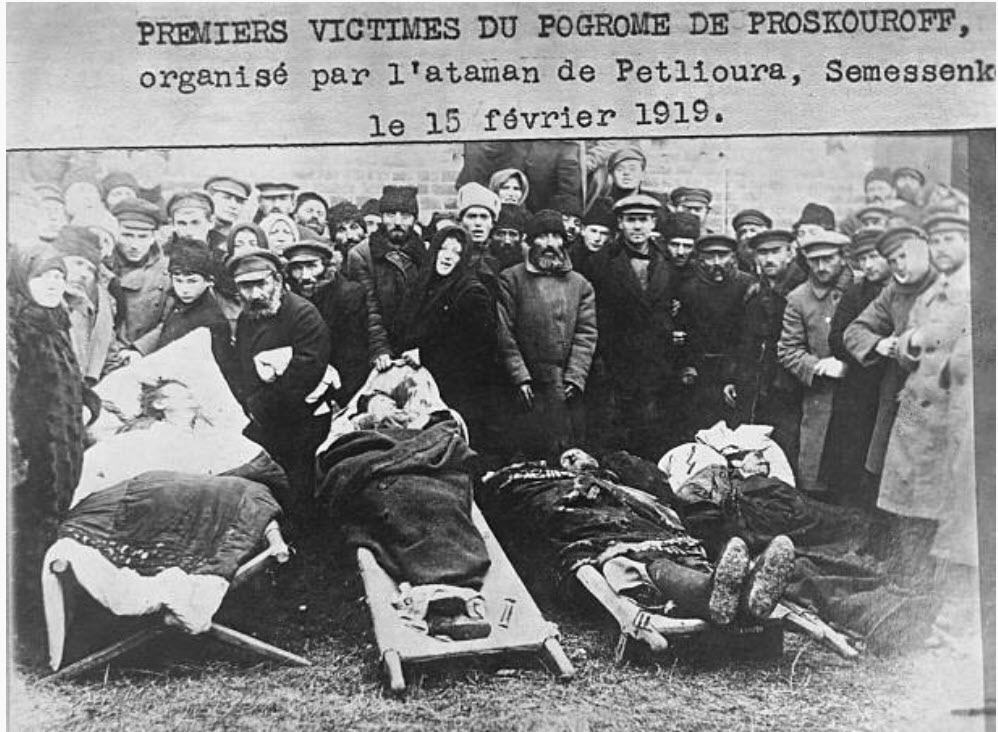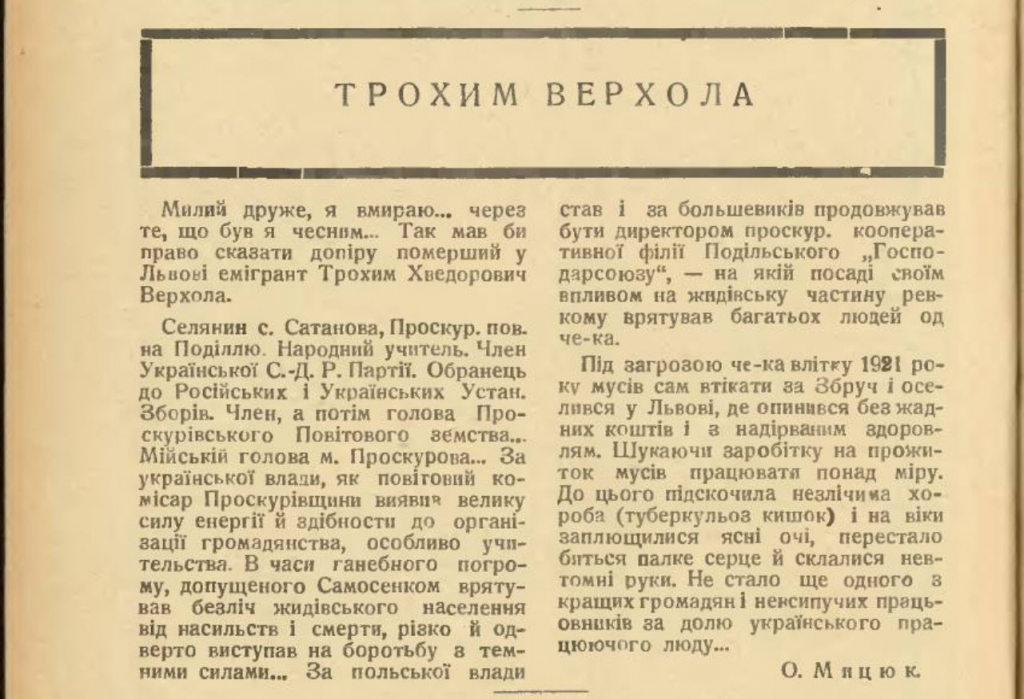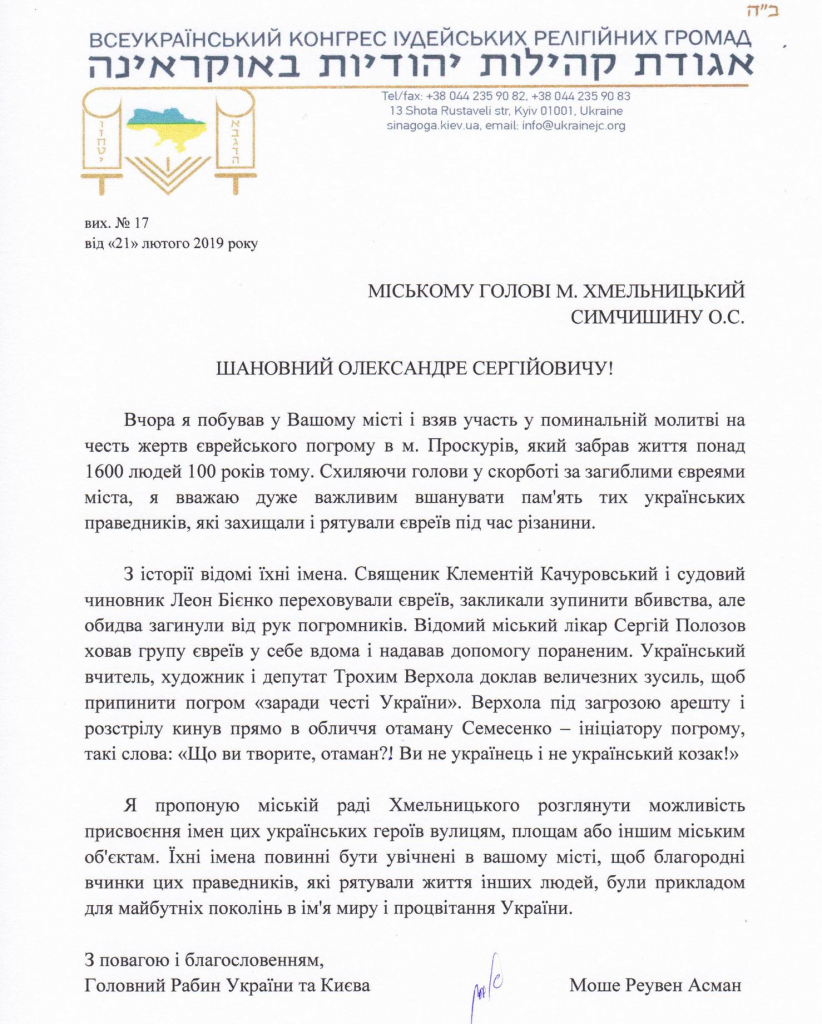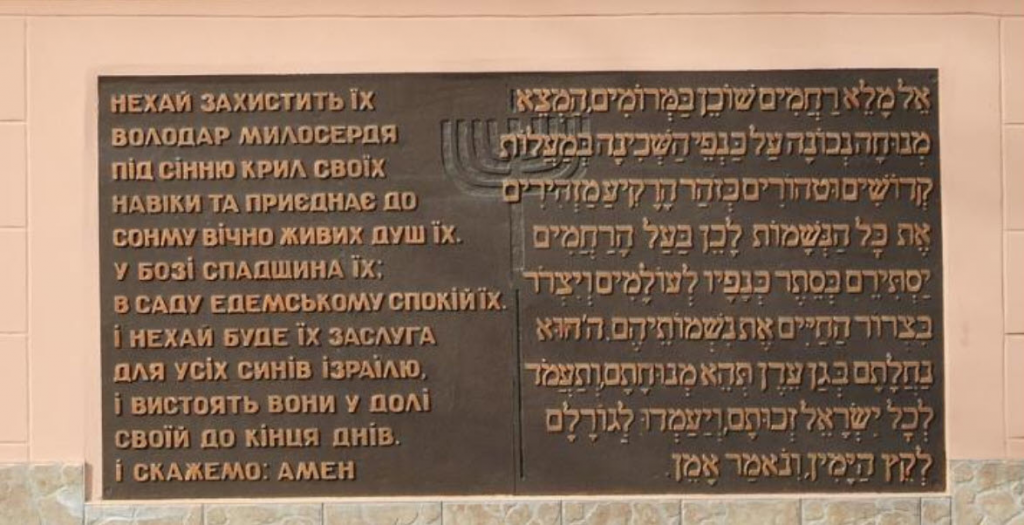A forgotten Ukrainian hero—defender of the Jews
Exactly one hundred years ago there was a terrible pogrom in the city of Proskuriv [Khmelnytsky]—the largest mass murder of Jews in the twentieth century before the Holocaust. While this terrible tragedy had its executioners, there was also a real Ukrainian hero, who is now almost forgotten.
More than 1,600 Jews were cruelly slayed by the Cossacks of the Zaporizhzhia Brigade named after Simon Petliura of the Ukrainian People's Republic [UNR]. By order of Otaman Ivan Semesenko, his Cossacks did not rob, but only killed Jews—targeting families, including the elderly, women, and infants. The peak of the massacre occurred over the course of three and a half hours on 15 February 1919, when the Jews observed Shabbat. Individual killings lasted two more days.
A local Ukrainian public figure, Trokhym Fedorovych Verkhola (1883-1922), a Ukrainian Social Democrat, teacher, artist, and educator, stood up against this massacre of civilians. Verkhola participated at the origins of the Ukrainian national revival in Proskuriv. After the revolution of 1917, he was elected as a deputy to the city council, the head of the Prosvita [Enlightenment] society, and as a representative to the Constituent Assembly of Russia. For some time, he was even the mayor of the city.
Verkhola had many years of good relations with the local Jewish community. There was a charming episode in March 1917 as he was preparing the first Ukrainian public demonstration in Proskuriv after the overthrow of tsarism. The preparation of the demonstration was on a Saturday, and all the shops of the city were closed for Shabbat, but Verkhola agreed with local Jews to receive yellow and blue fabric for sewing Ukrainian flags.
During the period of rule by Hetman Pavlo Skoropadsky, he was arrested by the Austro-Hungarian military authorities and sent to court in Lviv. After the overthrow of the hetman and the coming to power of Simon Petliura, Verkhola returned to Proskuriv on 12 February 1919—three days before the pogrom.
When Verkhola heard about the massacre of Jews, he went into the streets of the city and saw the slaughtered victims near many buildings. Verkhola urgently began to collect medicines for the wounded from pharmacies throughout the city.
The next morning, on 16 February, Verkhola convened an emergency meeting of the city council, which was attended by Otaman Semesenko and his assistant, the military commander Kiverchuk. Right outside the City Hall building, he saw Cossacks killing a Jew. Verkhola demanded an immediate halt to the massacre in Proskuriv and ordered Semesenko’s soldiers to return from the neighboring town of Felshtin, where they were dispatched for a new mass murder of Jews.
Verkhola declared right into the eyes of the killers’ commander: “What are you doing, Otaman?! You are not a Ukrainian or Ukrainian Cossack!” Verkhola demanded a stop the pogrom “for the sake of Ukraine’s honor”.
Semesenko denied the very fact of the massacre. He said: "I ordered the extermination of the Bolsheviks, and if among the Jews there are old men, women, and children who are Bolsheviks, then it is their fault, not mine".
Otaman Semesenko arrested Verkhola and wanted to shoot him, but the Ukrainian deputy was released at the request of local Ukrainian politicians.
It is interesting to note that the pogrom in Proskuriv was halted after the city’s Ukrainian activists sent an urgent telegram to Yevhen Konovalets, the corps commander of the Ukrainian army. The future creator of the OUN [Organization of Ukrainian Nationalists] immediately ordered Otaman Semesenko to stop the massacre.
Unfortunately, UNR head Simon Petliura did not punish Otaman Ivan Semesenko for the mass murder of Jews. Semesenko was shot in early 1920 for failing to comply with orders from Petliura.
Trokhym Verkhola remained a Ukrainian public figure in Proskuriv in 1919-1920. The Jews have always remembered with gratitude that Verkhola helped the victims of the pogrom and defended the Jews. Escaping from the Bolsheviks, Verkhola fled to Lviv in 1921. Local Jews helped him financially, but Trokhym was already seriously ill from tuberculosis. He died in 1922 in Lviv at the age of 39.
Verkhola is recalled in memoirs by the Ukrainian activist Natalia Doroshenko-Savchenko (1888-1974). From 1913-17 she lived in Proskuriv and together with Trohym Verkhola took an active part in Ukrainian national life. In 1921 she moved to Lviv, where before 1939 she was a librarian at the Prosvita Society. Later, she and her family emigrated to the United States. Her memoirs were published in Svoboda [Freedom] (New York, 25.12.1955) and were entitled "The Beginning of the National Revolution in Proskurivshchyna."
"T. Verkhola became the soul of the Community. He was a man of inexhaustible energy, extremely mobile, and above all totally devoted to the cause at hand. He was also an outstanding artist—a painter. In addition, he enjoyed popularity among the peasants of Proskurivshchyna, because he himself came from the peasants of Satanov. He was well regarded by the Jewish community. Incidentally, when later, in 1919, a Jewish pogrom broke out in Proskuriv, Verkhola contributed much to calm the situation. A grateful Jewry helped him when he emigrated to Lviv, when he was already heavily ill."
The name of Trokhym Verkhola is indicated on a Jewish monument to the victims of the pogrom in Proskuriv. The Kyiv rabbi Moshe Reuven Azman held a commemorative prayer near this monument, and then on 21 February 2019 addressed a letter to the Mayor of Khmelnytsky Olexander Symchyshyn.
Rabbi Azman proposed the Khmelnytsky City Council consider renaming streets, squares, or buildings in the city in honor of Trokhym Verkhola and other Ukrainian heroes who defended the Jews.
"The names of these people must be perpetuated in your city so that the noble deeds of these righteous figures who saved the lives of other people will be an example for future generations in the name of peace and prosperity of Ukraine," Azman emphasized.
Unfortunately, no photo of this best representative of the Ukrainian people has been found anywhere. I hope that at some point a street in the modern city of Khmelnytsky will be named in honor of the righteous Ukrainian intellectual Trokhym Verkhola.
The author thanks the archive specialist Nadia Lipes and Lviv historian Andriy Usach for the information provided on Trokhym Verkhola.
Text: Shimon Briman (Israel).
Edited by Peter Bejger.
Photos: Archival documents on the pogrom in the State Archives of the Khmelnytsky region; a plaque to the victims of the pogrom in the city.







